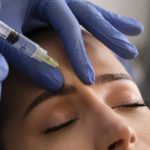Our board-certified dermatologists have been working with patients long enough to hear many of the same questions about skin and hair conditions. We will answer the eight most common dermatology questions our patients have asked over the years.
1. What are the best products for acne?
Acne is the most common skin condition affecting people in the U.S. It generally starts at puberty, but it can affect people in different stages of their life.
Acne develops when the pores become blocked, usually by excess oil, dead skin cells or bacteria. It can cause inflamed pimples, blackheads and painful bumps.
Topical treatments containing benzoyl peroxide can reduce the bacteria that cause acne. Products with salicylic or glycolic acid can remove the dead skin cells that lead to acne. Our clinics offer an acne cleanser that contains both acids to clean the skin and reduce breakouts.
2. Do I need to get yearly checks for skin cancer?
The simple answer is yes. Many types of skin cancer are curable if caught early. Melanoma, a form of skin cancer, can quickly spread to other body parts.
You should check yourself regularly for any changes in your skin, moles or spots that have changed, or new growths. Use the ABCDE method to look for signs of skin cancer. If you find any irregularities, schedule an appointment with your doctor.
Because skin cancer can develop anywhere on the body, an annual exam with a dermatologist can ensure you do not miss a hard-to-examine area, like the back. The cancer screening process only takes about 20 minutes and can be critical in early detection.
3. Does sunburn increase my chance of skin cancer?
Everyone should apply sunscreen daily, even if they are not planning to spend a day in the sun. If you are caught without it and develop sunburn, you may wonder if it increases your chance of skin cancer.
Sunburn damages the skin, but it does not cause cancer. However, repeated sunburn and overexposure to the UVB rays from sunlight can weaken skin cells and make them more susceptible to cancer.
To learn more, check out our guide that answers all your questions about sunscreen.
4. Will my rash go away on its own?
There are several types of skin rashes, which are simply irritations of the skin. Most will go away on their own in 2 to 3 weeks, but if your rash never clears up or worsens, it is time to see a dermatologist.
Non-infectious rashes like contact dermatitis, eczema or atopic dermatitis are not contagious. An allergen or environmental factors generally cause them. Monitor your skin and see a dermatologist to learn how to manage symptoms if it worsens.
Four types of skin infections can cause a rash: bacterial, viral, fungal and parasitic. A dermatologist can diagnose your type and provide treatment options, such as topical creams or in-office procedures.
A rash can be a sign of another issue, so if the inflammation is widespread, painful or blistering or you have a fever, see a doctor immediately.
5. Why is my skin so dry?
Dry skin is a common condition that cold weather, harsh skin products and frequent washing can aggravate. It occurs when the skin does not hold enough moisture. The skin naturally creates oils that lubricate itself, but using harsh soaps or washing too often can strip the skin of natural moisture.
We offer several types of moisturizers for different skin types. Products that contain hyaluronic acid or ceramides can provide deep moisture for dry skin.
If left untreated, dry skin can lead to inflammation or dermatitis, so see a doctor if the condition worsens.
6. Why do I sweat so much?
Sweating is the body’s way of cooling itself off, but some people have overactive sweat glands that trigger more sweat on the hands, feet, underarms and other parts of the body. Excessive sweating is called hyperhidrosis.
Someone with hyperhidrosis often sweats heavily enough to soak through clothes or socks. In most cases, it is not a serious medical condition, but it can be embarrassing.
We offer Botox treatments for hyperhidrosis. The injectable treatment is a neurotoxin that blocks the nerve signals to the sweat glands, so you produce less perspiration. The treatment usually lasts for 9 to 12 months.
7. What do you recommend for anti-aging?
Anti-aging treatments range from medical-grade skincare products to facial treatments to injections that soften muscles. What works for you depends on your age, your concerns and what you hope to achieve with cosmetic procedures.
We offer skin care products with retinol, a form of vitamin A that fights the signs of aging by exfoliating dead skin cells and boosts collagen and elastin. Products need to be used regularly to see improvements in your skin.
Aesthetic procedures like facials, dermaplaning and microdermabrasion can remove dead skin cells and leave your skin refreshed and soft with little to no downtime.
Injectables include treatments like neurotoxins that relax facial muscles to reduce fine lines and wrinkles, as well as fillers that plump up the skin. A specialist will use a syringe to inject the solution into the problem areas of your skin. Results are usually seen in a few weeks. They are not permanent and will need to be treated again to maintain results long-term.
8. What can I do about hair loss?
Thinning hair or a receding hairline can significantly impact how you feel about yourself. We offer platelet-rich plasma (PRP) therapy to increase the blood flow in hair follicles and encourage new growth.
PRP therapy has minimal risks. The results vary based on your age and gender. It often takes longer for men to see results.
People with hereditary hair loss have responded best to PRP therapy. Make an appointment with a dermatologist to see if you are a good candidate.
When should I see a dermatologist?
It’s best to be safe and proactive when it comes to your skin. If you didn’t find your questions among our most common dermatology questions, make an appointment to talk to one of our board-certified dermatologists. We can answer all your questions about changes in your skin or concerns about a mole or rash, as well as cosmetic dermatology procedures. We look forward to serving you!






